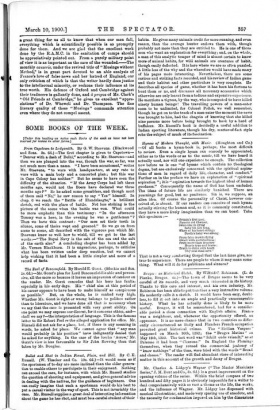Hymns of Modern Thought, with Music. (Houghton and Co.) —Of
all books a hymn-book is, perhaps, the most difficult to review. Even a single hymn can scarcely be appreciated, either as to the words or as to the music, till we have heard it actually used, nor will one experience be enough. The collection now before us is one "of hymns which contain no theological dogma, but are exclusively concerned with the spiritual aspira- tions of men in regard of daily life, character, and conduct." Farther on in the preface we have an explanation of "spiritual aspiration "; it is "aspiration towards the highest ideal of human goodness." Consequently the name of God has been excluded. The ideas of future life are similarly banished. There are yearnings for good, but no penitence. Sin is, we suppose, an alien idea. Of course the personality of Christ, however con- ceived of, is absent. If our readers can conceive of such hymns actually stirring the human soul, as it is commonly constituted, they have a more lively imagination than we can boast. Take this specimen :— "Britain's first poet,
Famous old Chaucer, Swan-like in dying Sang his last song, When at his heart-strings Death's hand was strong.
From false crowds flying Dwelt with soothfastness Prize more than treasure
Hearts true and brave : Truth to thine own heart Thy soul shah save."
That is not a very comforting Gospel that the last lined give, nor true to experience. There are people to whom it may mean some- thing. What will it do for publicans and sinners ?






































 Previous page
Previous page